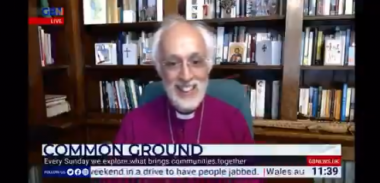Should the Bishops of Manchester and Liverpool resign?

What do the Bishops of Manchester and Liverpool have in common – apart from exercising a ministry in the north-west region of England?
The answer is that they have both been in the news recently because of controversial statements each has made in relation to ethical issues.
The Bishop of Manchester, David Walker, when asked about former UK Health Secretary Matt Hancock's affair with Gina Coladangelo, said in a television interview: 'I think I'm more worried about the fact that he failed to keep the social distancing than I am about the fact that here is a middle-aged bloke having a bit of a fling...'
The Bishop of Liverpool, Paul Bayes, in a talk to an Anglican pressure group, said in relation to issues of marriage and sexuality: 'Let the world set the agenda... The world beyond the church has set the moral agenda, and those who kneel with our footballers, or who see no difference between attending the marriage of their gay or their straight friends or work colleagues, find the community of faith to be wanting and indeed increasingly offensive. Nowhere is that more true than in the area of human sexuality.'
If we are an orthodox Christian of any denominational persuasion – whether evangelical, Pentecostal, Roman Catholic or Eastern Orthodox – what might we make of these seemingly extraordinary statements? First of all, I really can't be bothered to get into discussions about whether such bishops are 'woke' or not – even though it is a label the Bishop of Liverpool seems eagerly anxious himself to embrace (read paragraphs three and four of his talk). To me, 'woke' is increasingly a lazy, pejorative and dismissive term of abuse to be flung at anyone (usually left of centre) with whom we disagree, without actually engaging with the arguments they make.
But what I do care about is how closely the words of these bishops align with the teaching of Jesus. We are, after all, 'Christ'-ians. When it comes to the Bishop of Manchester, the poor theology of somehow making hypocrisy seem a worse sin than adultery has already been admirably and ably dissected by figures as diverse among others as Stephen Kneale, Giles Fraser on UnHerd, and Melanie Phillips on her blog.
In fairness to David Walker, however, he did go on to say this of Hancock's affair: 'It is a betrayal; it is a betrayal of marriage vows by both parties because both the people involved were married, both have got children. It is a betrayal. We really care about people who make those marriage vows, and many of them in our churches are keeping them, and we try to help them to do that.'
Maybe his words should and could have been stronger, but it was a live interview, and these are rarely easy. Nonetheless, the overall balance of what he said is troubling. Perhaps he could 'clarify' his remarks at the upcoming General Synod (July 9-12th)?
I feel rather more concerned by the Bishop of Liverpool. That incisive thinker Ian Paul dissects the truly abysmal level of thinking in Paul Bayes' talk on his Psephizo blog and says: 'What is most baffling in Bayes' position is the idea that "the world" has things sorted out on issues of sexuality and has a morally superior position.' And indeed he is right. After all, we (and especially bishops) should all know what Jesus teaches about 'the world' (John 14, 15, 16).
Scottish pastor William Still summed it up like this: 'There stands the world, and there stand I, and between us stands the cross. Viewed from the world's side I am crossed out, because branded with that hateful cross the world has no time for me. Viewed from my side the world is crossed out, for through my faith in Christ's death I have also died to the world; so that I and the world are agreed on one thing... only; that through Christ we have equally and mutually no time for each other.'
We are 'in' the world but not 'of' the world. It is not the world that sets the church's agenda – but the Word: in other words, Scripture, supported (though not supplanted) by 2,000 years of its interpretation through many wise and learned teachers in many denominations.
So can the Bishop of Liverpool's extraordinary statement just be left? It is true that since those words he has announced his intention to retire next February. There are only a few months more of his ministry. But as Ian Paul says: 'How Bayes can act as a shepherd to the orthodox in his diocese... I do not know. What is worse is that he has made these comments public—so he must intend those whose views he dismisses to know that he views them with such derision.'
With the best will in the world, unless he really can somehow act as a 'shepherd to the orthodox' in his Diocese – and without some further statement from him it is hard to see how that is remotely possible – then, very sadly, many will unavoidably conclude that, theological credibility in tatters, it is time for him to go. Now.
David Baker is Contributing Editor to Christian Today and Senior Editor of Evangelicals Now www.e-n.org.uk in print and online. He writes here in a purely personal capacity.











